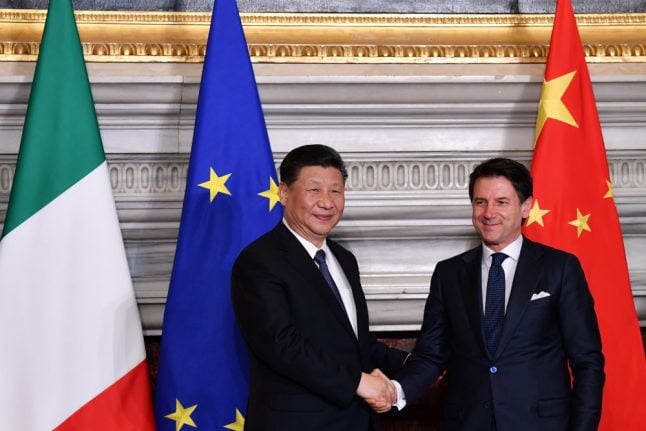In doing so, Italy became the first G7 country to sign up for the massive project which has sparked unease in the US and the European Union as China aspires to a greater world role.
Visiting Chinese President XI Jinping and Italian Prime Minister Giuseppe Conte both attended a ceremony for the signing of 29 memoranda of understanding which Italian media said were worth 5.0 to 7.0 billion euros.
Also signing the accords were the chairman of China's chairman of the National Development Commission He Lifeng and Italian deputy prime minister and Minister of Economic Development Luigi Di Maio.
Italian financial daily Il Sole 24 Ore said the value of the Chinese investments could rise to 20 billion euros but would for now be limited to the strategic ports of Genoa and Trieste.
Italy has rolled out the red carpet for Xi, who Friday sought to allay Western unease over his transformational infrastructure initiative by emphasising the $1 trillion project's mutual benefits.
Italian firms to benefit include the Ansaldo group, which wins a contract for making turbines, and the Danieli group, which lands a 1.1 billion euro deal to build an iron and steel plant in Azerbaijan.
The accords also foresee the opening up of the Chinese market for Italian oranges as well as a partnership for Chinese tourism giant Ctrip, notably with Rome's airports.
Cultural tie-ups including town twinnings are also on the agenda while Beijing is pushing to have several Serie A football matches played in China — although that would currently contravene regulations of the game's governing body FIFA.
“We are well aware, with this memorandum of understanding, that there is risk as well as opportunity,” said secretary of state for the economy Michele Geraci, who spent a decade working in China.
Italy has made a point of giving a full welcome to Xi, despite the misgivings in Washington and Brussels.
Critics say Beijing's ambitious maritime, rail and road venture is “predatory” and overwhelmingly favours China and Chinese companies.
But Friday, Xi rejected any idea of a conflict of interest after talks with his Italian counterpart Sergio Mattarella.
“China wants commercial exchanges to go both ways and for investment to
flow in both directions,” Xi said.
Mattarella responded that business must go “in both directions… with fair competition, respecting intellectual property rights while fighting counterfeit goods”.
In what some perceived as a snub, Italy's far-right Deputy Prime Minister Matteo Salvini did not attend Friday's state dinner for Xi at Mattarella's Quirinal Palace, having stated that Italy would be “no-one's colony.”
Salvini has notably urged caution about using Chinese telecom giant Huawei's next generation 5G mobile technology, whereas coalition partner Luigi Di Maio is keener for Chinese partnerships.
The United States has warned European allies that Huawei could use its 5G technology as a “backdoor” for spying, a claim that China has strongly rejected, calling them “abnormal, immoral” attacks.
READ ALSO: Italian government split over 'Silk Road' accord with China



 Please whitelist us to continue reading.
Please whitelist us to continue reading.
Member comments